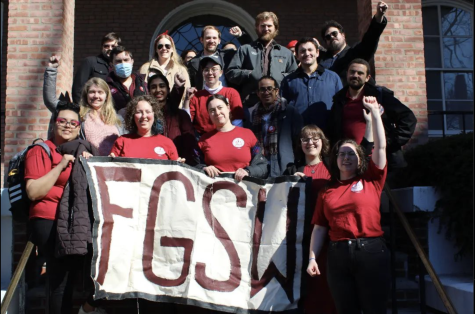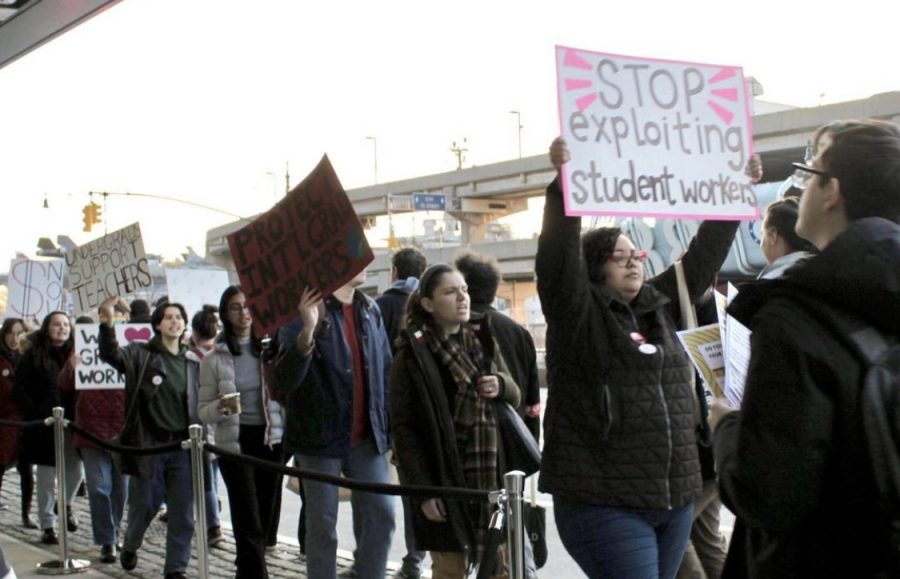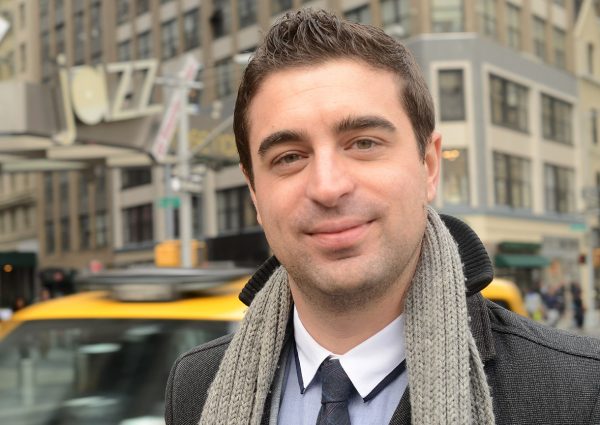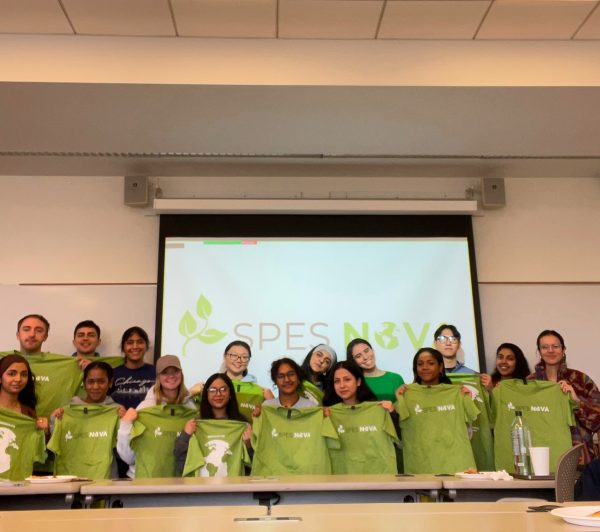How Fordham’s Graduate Student Workers Are Unionizing
Benjamin Van Dyne, a Ph.D. graduate student in Fordham’s theology department and a father of two young boys, was assigned to teach a class during summer 2022. A few weeks before he was supposed to start teaching, Fordham canceled the class, meaning he would not receive the $7,000 he was expecting to earn. Van Dyne said that left him in a big financial hole.
“I was scrambling to pay back the money that I had basically put on my credit card to pay rent and to buy groceries for me and the kids for the summer,” Van Dyne said.
Van Dyne says his scramble to make money continued into the autumn. In fall 2022, he was teaching his assigned class at Fordham, two more classes at two different universities in New York City and worked 20 hours a week at a church to make ends meet. “Then I had side gigs every weekend, just picked up work wherever I could get it,” Van Dyne said. “And did all of that, while trying to have enough time to also work on my own research on my dissertation proposal.”
Van Dyne explains that this experience is nothing new when it comes to working for Fordham. He says insufficient pay and a lack of respect are reasons why he and almost 250 other students have decided to join the Fordham Graduate Student Workers Union (FGSW). “We need to convince Fordham that our work here matters,” Van Dyne said. “Because we know it matters, and our students know it matters. But Fordham administration seems to not think it matters.”
The members of the FGSW are now in active negotiations with members of the Fordham administration, trying to hammer out the FGSW’s first contract. Details of the negotiations are confidential, but the union said it is fighting for fair working conditions against a university that is not interested in them. Fordham University said this is not the case.
The Ram attended the Student Town Hall earlier this week with President Tania Tetlow where Tetlow said that she wants to see negotiations come to fruition soon, though she declined to comment on specific issues while negotiations are ongoing.
“So we’ve gone through months of painstaking negotiations,” Tetlow said. “I will say that it’s hard to predict when that will come to an agreement, I hope very soon. I hope that we will find a way, do everything we can to make our graduate program as good and supportive and functioning and fair and within the market as we possibly can.”
Bob Howe, assistant vice president for communications and special advisor to the president, also said the university is working with the union and will continue to do so.
“We are in active negotiations with the graduate student union, and are optimistic we will reach an agreement,” Howe said in a statement to The Fordham Ram. “The resident assistants filed a petition with the National Labor Relations Board (NLRB): the University will respond to the petition and the NLRB will schedule an election sometime this semester. You should know regarding both unions, that it can take a year or more to negotiate the first contract with a new bargaining unit.” Howe declined to comment further, given the ongoing negotiations.
HISTORY OF THE UNIONIZATION EFFORTS
Graduate students only won the right to unionize a few years ago. In 2016, a group of graduate students at Columbia University brought a petition to the NLRB, asking for the recognition of a union that would allow students to have a say over issues they faced, including health insurance and payment. The NLRB ruled that “students who work as teaching and research assistants at private universities have a federally backed right to unionize.”
Since then, the United States has seen an influx of graduate students unionizing, namely in New York City and California.
Mardoqueo Arteaga, a doctoral candidate in economics at Fordham and the president of the graduate student council at the Graduate School of Arts and Sciences, which formally endorsed the unionization effort last year, said that the decision from the NLRB, compounded by a number of other factors since 2016, has spurred the rise of unions across the country.
“It’s not like we’ve had anything amazing happening for generations like ours,” Arteaga said. “We had a very difficult presidential cycle, with Trump coming on board. You have COVID, and COVID definitely instigated some panic in terms of jobs. It’s difficult in the world at the moment.”
Arteaga says that many students are feeling the implications of the lack of jobs and low-paying salaries. “People are doing grad school at a very peculiar time in their life, mostly in their 20s, some in their early 30s,” Arteaga said. “But these are times when you want to be able to at least have some sort of stability.”
M. Gaby Hurtarte Leon, a doctoral candidate in English and the Vice President of the Graduate Student Council (GSC), said that members of FGSW felt these effects and decided that they, too, should unionize. “There were a lot of things that we were noticing that weren’t great,” Leon said. “And we were like, well, we are actually workers. So we should be able to demand things as workers.”
A year before the COVID-19 outbreak, Leon said that some students from the English department started sharing their grievances about their working conditions with students from the philosophy department. The pandemic halted any sort of action from taking place, but once students began returning to campus, Leon said their efforts to unionize became much more active. “It was a well-structured organization, in terms of meetings,” Leon said. “We identified who the organizers were, and who we were trying to get to and figured out how many students we were missing from the bargaining unit.”
Van Dyne said that this newfound energy was partly due to many students being asked to do much more work to prepare for online and hybrid teaching and receiving no compensation for their time. “In compensation for that extra work, all we mainly got was just people emailing us to say, hey, thanks,” Van Dyne said.
In 2021, the graduate students interested in unionizing worked with the Communications Workers of America to establish an organizing committee of about 40 members. In February 2022, the group launched what is known as a card campaign, where students could officially indicate that they wanted to form a union. In April, FGSW held an election to officially establish the union, where graduate students voted 229 to 15 in favor of unionizing.
Leon said the whole process was quite inspiring. “It was really beautiful to see how it came from like, ‘let’s meet up at Rodrigue’s [Coffee House]’ four years ago, and then seeing it sort of die down, and then suddenly just be picked up again,” Leon said.
SALARY AND PAYMENT ISSUES
One of the biggest issues that motivated Fordham graduate students to unionize was their salaries. Van Dyne said he earns a stipend of about $29,000 a year after taxes. While students are paid for working 19 hours a week and are not supposed to exceed that number of hours, Van Dyne said they are routinely required to work more than that to finish all that they are supposed to handle. “So we are potentially in trouble for working the wrong number of hours no matter what we do,” Van Dyne said.
He says this takes a toll on him and his ability to teach. “I’m really tired of walking my kids to school and keeping such close track of every penny, that when we’re on the way to school and [my son] Oscar says ‘I’m hungry,’ I’m calculating my monthly income while deciding if we can stop for a bite,” Van Dyne said. “I don’t do my best research that way. I don’t do my best teaching that way.”
Moreover, Van Dyne said graduate student workers routinely have to use their own money to buy school supplies. “There is no support in the biggest or smallest senses of the word,” Van Dyne said. “Ranging from the fact that I can’t make a living all the way down to, I’ve now taught seven semesters, and I’ve never once been supplied with a dry-erase marker I didn’t pay for.”
Professor Ebru Turan, director of graduate studies in the department of history, said that the departments themselves have no knowledge or say over how much money the graduate students earn. “I assume they are not getting paid much, I can tell you that much,” Turan said. “The department tries to support them in every way that we can. But when it comes to financial matters, it is out of our hands.”
Other graduate students expressed other complaints about their treatment by the university. Olivia Geraci, a master’s student at the center for medieval studies, explained that not only are there issues with how much students get paid but also with the timeliness with which they do. She explained that Fordham often does not pay their student workers on time.
“I know that timely pay has definitely been an issue for a lot of people in a lot of departments at Fordham,” she said. Geraci added that this could affect people living paycheck-to-paycheck.
The Ram reached out to Graduate School of Arts and Sciences Dean Ann Gaylin in order to find out how salary decisions were made. Gaylin declined to comment while the negotiating sessions are underway.

PROBLEMS INTERNATIONAL STUDENTS ARE FACING
International graduate students face a unique set of issues regarding housing and said that Fordham has not supported them adequately. In New York City, a tenant generally must make 40 times the rent, or a guarantor must make between 80 and 100 times the rent before a student is allowed to sign a lease. The stipend being paid by Fordham would not allow most graduate students to meet the income requirements on most apartment rentals, but Turan explained that international students usually cannot depend on guarantors either because their families and other people they may know and trust potentially do not live in America.
“You have to have a past here to rent an apartment,” Turan said. “And these people are outsiders, they have, like, no record here.” She said that there has been discussion within the departments to see if there are any actions that can be taken by faculty. “If we can give them any help in the dormitories, but I don’t know if that has been realized. But this is again like many things at Fordham, it is not in our control,” Turan said.
Javier Calderon Abullarade, a master’s student in the history department, said that low salaries and the university’s limit on working more than 19 paid hours per week have caused him to move back to Guatemala, where he is from, to finish his master’s remotely. Abullarade said that not having these restrictions would have allowed him to stay at Fordham. “It would have allowed me to stay living in New York City, which is important to take advantage of the different opportunities that I have in the university,” Abdullarade said. “And that would have allowed me also to travel back and forth from my country to the United States and do some research that I can only do in American archives.”
During the Virtual Town Hall earlier this week, Tetlow addressed the issues that international students face, though she did not specifically comment on the housing issues. Tetlow said Fordham has been lacking in their support of international students and wants that to change.
“I’ve heard from a lot of angles, not just in the graduate school, but the undergraduate too, that we have fallen a little behind in our support of international students, so we are making those things a priority in our budget next year,” Tetlow said. “But the daunting tasks of just how to open a bank account when you don’t have a social security [cont. next page] number in this country, all the logistics are so painfully hard, especially if you’re doing it in your third or fourth language. We need to do more to support those students.”
Despite this, in a recent email sent out by FGSW, committee members said that Tetlow said that she and Fordham will not prioritize international students.
“Tetlow made clear in ‘office hours’ today that she stands by every decision made by her bargaining team, that she is consulted for every response they give us and that she approves everything they say—particularly that international graduate workers should not expect any support from Fordham University, even when facing being unhoused and food insecurity,” the email stated.
WHAT IS THE UNION SEEKING?
The union members said they have 11 main issues that they are negotiating with the university. Graduate students said the biggest issues the union is looking to resolve are compensation and benefits for international students.
As for salary, Leon said the union is proposing timely pay and a $28 per hour wage for hourly workers or a stipend of $60,000 a year for funded graduate students, which is the livable wage in New York, according to the Bureau of Labor Statistics Cost of Living Adjustment. The union’s proposal would also allow Fordham to serve as an institutional guarantor and provide summer funding for international students.
Another issue the union said it wants to address is the use of non-disclosure agreements (NDAs). Van Dyne said that the university is unclear as to how and why they use NDAs with regard to victims of harassment and discrimination.
“They keep telling us that they use those agreements, and it’s for the victims’ own good that they’re prevented from speaking,” Van Dyne said. “And then they’ve also started to say in other settings that, ‘Oh, no, we would never use non-disclosure agreements.’ So it’s not clear what the truth is. What we know is that they’re not willing to put in writing that they will not use them going forward.”
Other proposals the union said it wants to address include timely work assignments, adequate teaching resources and parking passes.
In the email sent out by FGSW, committee members said that President Tetlow said the requested salary increases are excessive. “In response to graduate workers’ demands for higher wages, President Tetlow said our asking for raises is unreasonable,” the email stated.
The Ram approached multiple other university officials for additional comment on these and other specific issues brought up by union organizers, but the university and many professors dealing with graduate education declined to comment further while the negotiations are ongoing.
POINTS OF CONTENTION
FGSW organizers said they face additional challenges — for instance, there are still a number of graduate students who do not know about the union or do not think they could be supported by the union.
Alex DiFiore, a master’s student in the mental health counseling program, said he did not even know about the union until queried about it by the Ram. “I would definitely consider joining, especially once I’m in a Ph.D. program,” DiFiore said. “I feel the only reason that I haven’t before is because I never had any exposure or seen anything about it.”
Others like Calderon Abdullarade, who have heard about the union, say they feel like the union may not be representative of their issues.
“I felt that the union was much more representative of the issues of the Ph.D. students than my issues,” Abdullarade said. “Even though they actually asked me if I had issues because they contacted me, I didn’t feel that I could actually use their support.”
There are also some doubts about the efficiency with which the union can work, according to Arteaga. Despite being in the union, he said he worries that the union could hinder students from looking toward their futures.
“To fight for a union that is really only going to have some sort of effect for somebody for a year, two years tops, is a very interesting way of spending your time,” Arteaga said. He adds that the temporary nature of graduate school might not work well with the permanence of unionization. “Leaving the university and finding something stable is what I would consider to be the more useful way of spending your time. But maybe that’s just me being jaded. I mean, I want to be able to support as many students as possible, and perhaps this is an avenue to do so.”
Some of those students who do know about FGSW have negative sentiments surrounding the union, according to Geraci. She said that it is easy for organized labor to be demonized. “I think that there can be a misconception of union members as just being greedy or being lazy,” Geraci said. “And I don’t think that that’s true at all.”
The email sent out by FGSW also stated that Tetlow accused the union members of thinking they are “more important than other students and staff at Fordham.”
The email also stated, “President Tetlow told an FGSW and bargaining committee member that this student and graduate workers writ large are ‘entitled’ and ‘bully’ her and her bargaining team.”
WHAT’S NEXT?
As the graduate student union continues to negotiate a first contract, members of its leadership said they have taken inspiration from Fordham Faculty United (FFU), a union that represents the contingent faculty at the school and recently was able to come to an agreement with Fordham on its second contract.
Geraci said that there is a supportive union spirit among the graduate student organizers and said she was very proud and excited to see FFU succeed in its efforts to achieve fair working conditions. “I think that there’s definitely a lot that we’ll be able to learn from their experience,” Geraci said.
FGSW members said they are going to continue fighting against what they see as unfair working conditions. But Van Dyne said that, until their contract gets approved or the union members are forced to strike, he and others will continue to struggle.
“On a typical day, six days a week, I was starting at 7:45 or 8 a.m. to get the kids off to school, and going until 9 or 10 p.m., six days a week. That’s my situation,” he explained.
Van Dyne said many Fordham graduate students have some version of that story. “For me, it’s kids, but other people have parents to take care of or other stuff, or they have rich full lives that are also worth having. Right?” Van Dyne said. “Everybody deserves a good life. Everybody should make a living wage.”












































































































































































































Richard Rodriguez • Apr 24, 2023 at 9:51 pm
Van Dyne said. “Everybody deserves a good life. Everybody should make a living wage.” Too bad but life is not fair. No one is guaranteed a good life and no one is guaranteed a living wage. I should know. I grew up in East Harlem and the South Bronx. Public housing with a single mom and a younger sister. I was accepted at Brooklyn Tech in 1962 and graduated June 1966. I can read it for four years from the south Bronx to Brooklyn tech riding the subway. Upon graduation I was excepted at Fordham University. After graduation I worked at Fordham part-time well I completed my masters in New York university. Then in 1971 I was accepted at Harvard business school and graduated 1973 with a major in marketing and finance. My younger sister was excepted at Fordham in 1970 and graduated four years later. He later obtained a teaching certificate from Columbia College. Life is not guaranteed and success is not guaranteed. You’re going to have to make adjustments and not rely on Fordham to provide you with all of your needs. I understand you are probably attending the school tuition free plus being paid a salary you guys call it a stipend, but it is a salary, you need to sit down with your family and decide what makes the most sense for you and not feel that the school is entitled to give you and take care of all of your needs including housing, medical care, etc. Society doesn’t owe you anything you should get that into your head you were coming across as a spoiled kid I’m Puerto Rican my family came here in the 1930s we worked hard struggled, honored education and were successful. No one owes you anything.
Leunora L • Apr 5, 2023 at 10:38 pm
Goooo girl 💕💕🥰🌹🤲